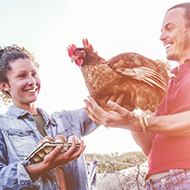Chicken ownership on the rise, survey reveals

"People worried about food supplies and saw chicken ownership as a source of fresh food" - Ben Braithwaite.
There is a growing trend in chicken ownership in the UK, with up to 200,000 new chicken owners appearing year on year since 2018, according to new research.
A survey by Cambridge-based firm ChickenGuard found that in 2019, there were 1,028,000 chicken owners in the UK, rising to 1,338,000 in 2020. The organisation says this figure has further risen during the coronavirus pandemic, as more people moved to chicken ownership as a sustainable food source.
Ben Braithwaite from ChickenGuard comments: “We have been closely monitoring the rise in chicken ownership over the last couple of years and the pet survey has really shone some light on the growing trend in countries all over the world. The pandemic has brought more households into the fold as people worried about food supplies and saw chicken ownership as also a source of fresh food.
“That, alongside the increase in celebrity keepers, has made chickens more popular than the hamster, guinea pig and the previously most popular feathered friend, the budgie.”
The British Hen Welfare Trust (BHWT) has also reported an uptick in the number of people wanting to re-home chickens during the coronavirus pandemic. Speaking to Sky News earlier this year, BHWT founder Jane Howorth said that the charity's waiting list had grown to record numbers.
"Although this is typically a busy time of year for us as the spring sunshine emerges and people become more interested in outdoor activities, without doubt, COVID-19 has increased interest further still," she said. “A lot of people have been thinking about keeping hens for some time, others simply want to have a supply of fresh eggs at the bottom of the garden."



 The Veterinary Medicines Directorate (VMD) is inviting applications from veterinary students to attend a one-week extramural studies (EMS) placement in July 2026.
The Veterinary Medicines Directorate (VMD) is inviting applications from veterinary students to attend a one-week extramural studies (EMS) placement in July 2026.